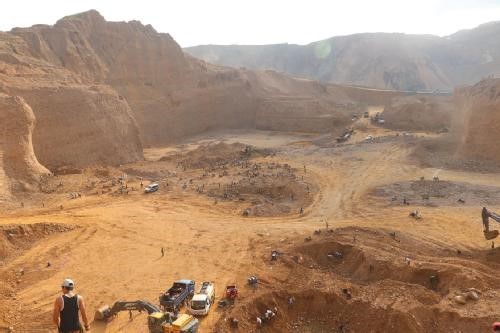Sustainable lives in scarred landscapes
Contact details
Email: mandy.sadan@warwick.ac.uk
E-profile: Dr Mandy Sadan (warwick.ac.uk)

Image description: a selection of jade jewellery on sale in Tengchong market, Yunna (credit: Mandy Sadan)

Image description: photograph of the jadeitemines in Hpakant (Kachin, Myanmar). The photo shows the extensive environmental devastation caused by the mining. (credit: L. Naw Tun, Kachinland Research Centre)
Sustainable lives in scarred landscapes
Professor Mandy Sadan, Global Sustainable Development
This project is funded by the British Academy. It is a collaboration between the School of Global & Area Studies, University of Oxford, Professor Dan Smyer Yu, Kuige Professor of Ethnology, Yunnan University, and the Kachinland Research Centre, Myitkyina, Kachin State, Myanmar. Other project team members include Dr Henrik Kloppenburg Møeller, PositiveNegatives and Siobhan Warrington, founder of Oral Testimony Works.
The jadeite trade is a vitally important part of the domestic economy in Myanmar, supplying a huge demand for jadeite within China, where it is valued as a historically and culturally important commodity. However, the region where jadeite is found lie in Kachin State, Myanmar, where there has been ongoing conflict with various Myanmar regimes since the 1960s. Changes to the country from the 1990s onwards, including a period of ceasefire with the Kachin Independence Army, led to dramatic changes in mining practices. Local artisanal miners were progressively excluded from the mines, and large companies using industrial diggers devasted the region within a few short years. Hills covered with dense forests disappeared, water sources became polluted and people were forced into handing over their lands to companies and government cronies. The result has been environmental devastation and the proliferation of social crises, particularly relating to the widespread availability and use of heroin and methamphetamine in the region. Household economies across the region have been devastated.
To date, most interest in the mines has focused on issues such as anti-corruption campaigns and implementing EITI (Extractive Industries Transparency Initiative) as a way of changing mine governance structures. However, our project seeks to document the everyday experiences of people involved with the jadeite trade from the mines to high-end jewellery designers and sellers in China to increase understanding of how the jadeite trade is implicated in the everyday domestic economy in ways that are not fully visible or understood by those who focus on managing extractive industry companies at a higher level. In addition, we want to encourage communication and information flows about the impacts of industrial jadeite mining across the Myanmar China border. Many people involved in the trade in China have minimal or no knowledge about the devastating effects of the trade on the Myanmar side of the border.
We are producing a number of publications, including a volume of Life Stories with NIAS Press. However, we are also working with local artists and with PostiveNegatives to develop educational materials. We hope to have a workshop on issues arising from the project at Warwick in the not too distant future!
Return to our Research Projects page.
